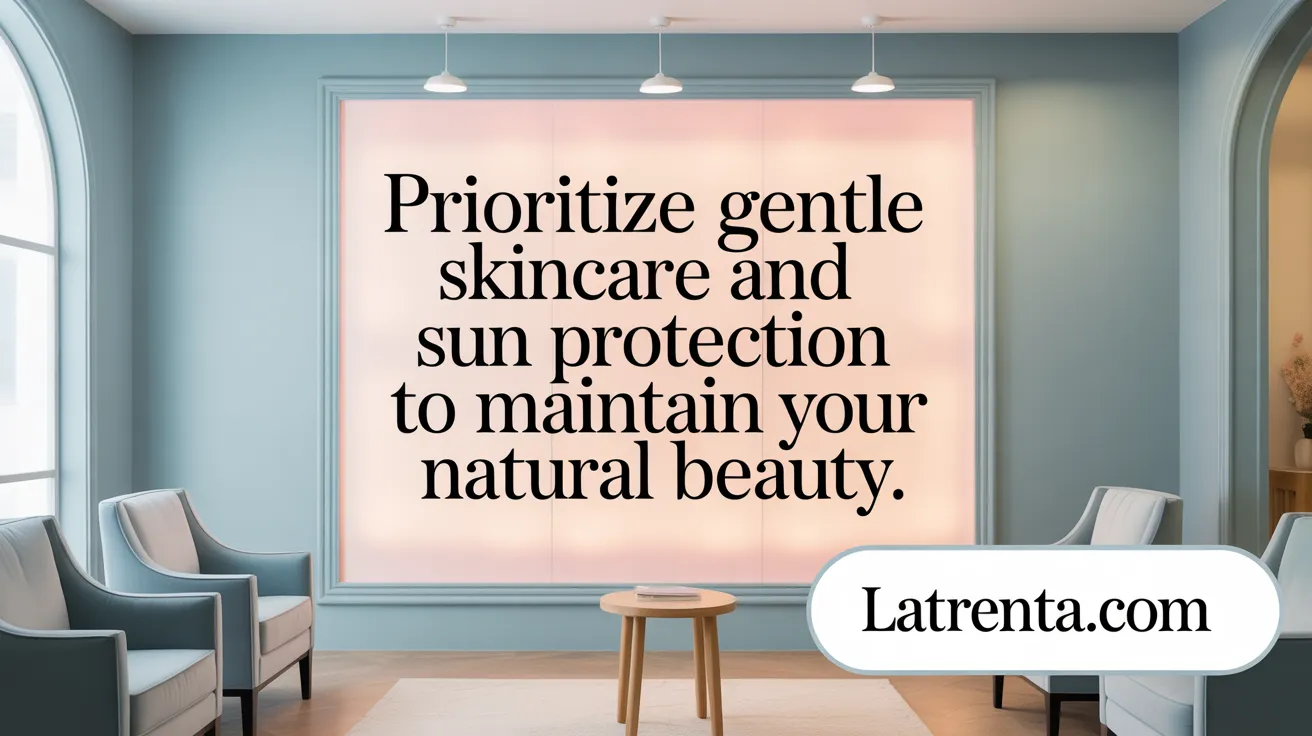The Crucial Link Between Lifestyle and Skin Healing
Understanding how lifestyle choices affect skin recovery after aesthetic procedures can transform not only how quickly you heal but also the longevity of your results. From diet and hydration to exercise and sun protection, every aspect of your daily habits plays a key role in skin regeneration and maintaining youthful, healthy skin post-treatment.
The Impact of Lifestyle Choices on Post-Treatment Skin Recovery and Healing

How do lifestyle choices impact post-treatment skin recovery and healing?
Lifestyle decisions significantly influence how well skin heals after aesthetic procedures or skin treatments. Eating a diet rich in essential nutrients such as proteins, vitamins A, C, and E, zinc, and omega-3 fatty acids supports collagen production, reduces inflammation, and helps rebuild the skin's barrier. Proper nutrition accelerates tissue repair and enhances overall skin resilience.
Hydration also plays a fundamental role. Drinking plenty of water ensures that blood flow and oxygen transport reach damaged tissues efficiently, which is crucial for cell regeneration and healing. Including water-rich foods like cucumbers, watermelon, and citrus fruits can further support this process.
However, harmful habits like smoking and excessive alcohol consumption can undermine recovery. Nicotine and carbon monoxide from smoking impair blood flow, leading to less oxygen and nutrients reaching the skin, while alcohol can cause dehydration and suppress immune responses. These effects slow down wound healing, increase risks of infections, and may lead to complications.
In addition to diet and substance use, managing stress and ensuring sufficient sleep are vital. Chronic stress elevates cortisol levels, which can break down collagen and cause inflammation, whereas restful sleep allows for cellular repair and reduces inflammation, creating a more conducive environment for healing.
Engaging in moderate exercise improves circulation, boosts immune function, and promotes faster recovery. Regular movement increases cutaneous blood flow, delivering essential nutrients to the skin and helping to remove waste products.
In summary, adopting healthy lifestyle habits—balanced diet, hydration, avoiding harmful substances, stress management, adequate sleep, and gentle exercise—can significantly enhance skin healing post-treatment and lead to better, long-lasting results.
Key Behaviors Influencing Skin Recovery: From Smoking to Sun Protection

What role do behaviors like smoking, alcohol consumption, diet, exercise, sleep, hydration, sun protection, and stress management play in skin recovery?
Healthy habits are crucial for effective skin healing after cosmetic treatments or injuries. Smoking significantly impairs blood flow due to nicotine and carbon monoxide, leading to slower healing, wound complications, skin necrosis, and increased infection risk. It accelerates skin aging, causes wrinkles, and damages skin cell repair processes.
Excessive alcohol intake interferes with immune function, increases bleeding risk, causes dehydration, and may interact negatively with medications that support healing. Chronic alcohol consumption can worsen skin quality and slow recovery.
On the other hand, a balanced diet rich in proteins, vitamins, minerals, and antioxidants provides the building blocks for tissue rebuilding and immune support. Nutrients like zinc, vitamin C, vitamin A, and omega-3 fatty acids promote collagen synthesis, reduce inflammation, and enhance skin elasticity.
Regular physical activity improves microcirculation, increasing skin blood flow by up to 8 times during intense workouts which boosts nourishment and oxygen delivery. Exercise also stimulates hormone secretion like growth hormone and estrogen, essential for collagen production and skin vitality. Moreover, exercise promotes mitochondrial biosynthesis, aiding in delaying skin aging signs such as loss of elasticity.
Adequate sleep (7-9 hours each night) reduces inflammation, supports cellular repair, and enhances immune function, crucial for optimal skin healing. Proper hydration through water and water-rich foods maintains skin elasticity, assists in nutrient transport, and prevents dryness.
Sun protection, through daily use of broad-spectrum SPF, protective clothing, and avoiding peak sunlight hours, shields the skin from UV damage, hyperpigmentation, and premature aging. Limiting sun exposure is especially important during post-treatment phases.
Managing stress with techniques like meditation or deep breathing reduces cortisol levels, decreasing inflammation that can impair skin health. Chronic stress accelerates skin aging and hampers recovery.
By integrating these behaviors, individuals can create a comprehensive strategy to support skin recovery. Avoiding harmful habits and cultivating healthy routines optimize healing, improve treatment outcomes, and preserve skin health long-term.
Exercise as a Powerful Tool for Enhancing Skin Health and Rejuvenation
How does exercise affect skin health and appearance?
Regular physical activity significantly benefits the skin by boosting blood circulation, which enhances the delivery of oxygen and essential nutrients to skin tissues. This process promotes the synthesis of collagen and new skin cells, resulting in improved elasticity, firmness, and a radiant glow. Exercise also plays a role in detoxifying the body, helping to eliminate waste products that can lead to dull skin and breakouts.
Furthermore, engaging in consistent exercise reduces stress levels and supports better sleep, both of which are vital for skin health. Lower stress hormones decrease inflammation and skin flare-ups like acne, eczema, and psoriasis. Good sleep allows skin cells to repair, contributing to a more youthful, vibrant complexion.
However, it’s important to maintain proper skincare routines during physical activity. Without adequate cleansing and sun protection, sweat and environmental exposure can clog pores or lead to irritation. Protective measures such as gentle cleansing post-exercise and SPF application help maximize skin benefits while minimizing potential issues. In essence, regular exercise, paired with diligent skincare, supports a healthy, glowing, and resilient skin.
Can exercise reverse or rejuvenate aging skin?
Exercise possesses the potential to delay signs of skin aging and promote a more youthful appearance. By improving skin elasticity and increasing dermal thickness through enhanced blood flow, exercise supports collagen and extracellular matrix production. Resistance training, in particular, stimulates deeper support structures, contributing to firmer skin.
Beyond superficial effects, exercise induces systemic hormonal and metabolic changes that influence skin aging. It elevates growth hormone and enhances mitochondrial function, which in turn boosts antioxidant defenses, reducing oxidative stress—a major factor in skin aging.
Studies show that aerobic and resistance exercises not only improve blood circulation but also foster skin cell vitality, texture, and overall brightness. Regular physical activity can slow or partially reverse aging signs such as sagging, fine lines, and loss of tone. While it may not fully erase age-related changes, maintaining an active lifestyle supports ongoing skin renewal and a more youthful, healthy appearance.
Further insights
Studies and expert opinions suggest that the combination of physical activity, proper skincare, and healthy lifestyle choices synergistically benefits skin health and longevity. Regular exercise remains a vital element in the regimen to promote ongoing skin vitality and delay the visible signs of aging.
Search keywords: exercise benefits for skin health aging recovery.
Nutrition and Hydration: Foundations for Optimal Skin Recovery
How do nutrition and dietary habits influence skin recovery after aesthetic procedures?
Nutrition and eating habits are vital for effective skin healing post-treatment. They supply the essential building blocks needed for tissue repair, immune support, and collagen production. Proteins and amino acids are crucial, as they help in regenerating skin tissues. Vitamins such as A, C, and E play antioxidant roles and support collagen synthesis, making the skin firmer and more resilient.
Minerals like zinc promote immune response and tissue healing, while omega-3 fatty acids reduce inflammation and irritation. These nutrients not only accelerate recovery but also improve the overall quality of skin post-procedure.
A diet rich in fresh fruits, vegetables, lean meats, and healthy fats emphasizes skin health. Including antioxidant-rich foods like berries and citrus can neutralize free radicals that damage skin cells. Hydration is equally important; drinking ample water helps transport nutrients, remove waste, and maintain skin elasticity.
Conversely, poor eating habits—high sugar, processed foods, excessive alcohol—can increase oxidative stress, slow healing, and undermine treatment results. To optimize outcomes, patients should follow personalized nutritional guidelines that focus on sufficient nutrient intake while minimizing foods that hinder healing. This holistic approach greatly enhances skin repair, maintains treatment benefits, and supports long-term skin vitality.
The Vital Role of Sleep and Stress Management in Skin Healing and Aging
Does poor sleep quality affect skin aging and recovery?
Poor sleep quality can significantly worsen skin aging and hinder the recovery process after skin treatments. When sleep is insufficient or disrupted, the skin's natural repair mechanisms slow down, leading to premature aging signs such as fine lines, wrinkles, and discoloration. Lack of restful sleep impairs collagen synthesis—the protein responsible for skin elasticity and firmness—and reduces cellular repair, resulting in dull, dry, and less resilient skin. Additionally, poor sleep increases inflammation and weakens the skin’s barrier function, making it more vulnerable to environmental damage and slower to recover from stressors like UV exposure or injuries. This combination accelerates visible aging signs and prolongs healing time after procedures or skin injuries. Therefore, consistent, high-quality sleep is crucial for maintaining youthful, healthy skin and ensuring effective recovery.
What lifestyle modifications and guidelines can optimize skin healing after treatments?
To support optimal skin healing, adopting healthy lifestyle habits is essential. A balanced diet rich in nutrients like protein, vitamins A, C, zinc, and omega-3 fatty acids provides the building blocks for tissue repair, immune function, and inflammation control. Staying well-hydrated through water and water-rich foods enhances skin elasticity and facilitates nutrient transport.
Protecting the skin from additional damage involves diligent sun protection using broad-spectrum SPF sunscreens, wearing protective clothing, and seeking shade, especially during peak sunlight hours. Avoiding smoking and limiting alcohol consumption improve blood flow and oxygen delivery to damaged tissues, promoting faster healing.
Physical activity—particularly moderate exercise—can boost circulation and immune response, further aiding recovery. Managing stress through relaxation techniques, combined with ensuring adequate sleep, reduces inflammatory responses and supports cellular repair.
Following professional guidance on skincare routines and nutritional intake, possibly supplemented with specific nutrients, can also enhance skin recovery. Overall, a holistic approach that combines good nutrition, sun protection, lifestyle habits, and stress management creates an environment conducive to rapid and healthy skin healing after aesthetic or dermatological treatments.
Post-Treatment Skincare and Sun Protection: Essential Practices for Longevity

Gentle skincare regimens post-treatment
After any aesthetic procedure, using gentle, hydrating skincare products is vital for optimal healing. Avoid harsh cleansers, exfoliants, retinoids, and acids for at least a week, as they can cause irritation. Instead, opt for mild cleansers and moisturizers that contain hydrating ingredients like hyaluronic acid to support skin recovery.
Sun protection strategies
Sun exposure significantly impacts the longevity of treatment results. Use broad-spectrum sunscreens with SPF 30 or higher daily, especially in high-temperature environments like Dubai. Protective clothing, wide-brimmed hats, and sunglasses further shield the skin from UV rays. Minimize sun exposure during peak hours, between 10 AM and 4 PM, to prevent pigmentation, premature aging, and skin damage.
Avoiding irritants and harmful products
Post-treatment skin can be sensitive; avoid skincare products with retinol, glycolic acid, or other strong chemicals for about a week. These can irritate new or healing skin and delay recovery. Also, steer clear of hot showers, steam rooms, or saunas, which can exacerbate irritation and swelling.
Role of hydration in skin maintenance
Proper hydration is key to maintaining skin elasticity and supporting healing. Drink at least 8 glasses of water daily and include water-rich foods like cucumbers, watermelon, and citrus fruits in your diet. Adequate hydration helps reduce inflammation, improve collagen synthesis, and extend the lasting effects of aesthetic treatments.
Preventing pigmentation and damage
To prevent hyperpigmentation and further skin damage, consistently apply sun protection, follow skincare routines with hydrating and antioxidant-rich products, and avoid excessive sun exposure and damaging environmental factors. Staying consistent with these habits preserves youthful skin and enhances long-term results.
Sustaining Aesthetic Results Through Healthy Lifestyle Habits

How important are lifestyle factors in maintaining or enhancing post-treatment aesthetic results?
Lifestyle choices are fundamental to the longevity and effectiveness of aesthetic procedures. Regular physical activity improves blood flow, which supplies oxygen and nutrients to the skin, promoting faster healing and better skin quality. Exercise also stimulates hormone secretion, such as growth hormone and estrogen, which support collagen production and skin elasticity.
Adequate sleep is equally vital, as it allows the body to repair tissues, reduce inflammation, and maintain overall skin resilience. A balanced diet rich in proteins, vitamins, minerals, and antioxidants supplies the essential building blocks for tissue regeneration and immune support.
Conversely, harmful habits like smoking and excessive alcohol intake significantly impair blood circulation and wound healing, increasing the risk of complications and diminishing aesthetic outcomes. Poor dietary habits, dehydration, and chronic stress further undermine skin health and treatment benefits.
In summary, embracing healthy lifestyle practices—including consistent exercise, a nutritious diet, sufficient sleep, and abstaining from smoking and excessive alcohol—is crucial for preserving and enhancing aesthetic treatment results. These habits not only support the body's natural healing processes but also help sustain a youthful, radiant appearance over time.
Embracing a Lifestyle that Supports Radiant Skin Recovery
Post-treatment skin recovery extends beyond clinical care; it demands a holistic dedication to healthy lifestyle choices that nurture regeneration and enhance results. By integrating balanced nutrition, consistent hydration, regular exercise, sufficient sleep, effective stress management, diligent sun protection, and avoidance of detrimental habits like smoking and excessive alcohol, individuals can optimize healing, delay skin aging, and maintain the lasting benefits of aesthetic procedures. This comprehensive approach not only accelerates recovery but also lays the foundation for resilient, youthful skin over time, underscoring the profound influence lifestyle has on post-treatment skin health.
References
- The Role of Lifestyle Factors in Cosmetic Surgery
- The Potential of Exercise on Lifestyle and Skin Function
- Lifestyle Tips to Maximize Skin Resurfacing Results (2025)
- Can Lifestyle Factors Influence the Outcome of a Facelift?
- Recommended Lifestyle Changes After Skin Booster Treatment for ...
- The Role of Nutrition in Enhancing Aesthetic Treatment Results
- How to take care of your skin for rapid recovery after laser skin ...
- The Impact of Lifestyle on Skin Aging and How Aesthetic Treatments ...
- How Diet and Lifestyle Affect Aesthetic Treatment - The Clinic Room
